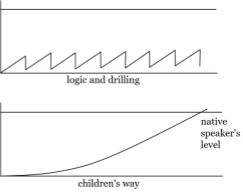Alena Antalíková
So much has been written about methods of learning foreign languages it would easily fill a small library. And yet, the most efficient approach is one that the nature itself devised, one that helps children to learn their native language in early childhood. Their unique approach is the reason, why kids' results are so much greater compared to students studying from textbooks filled with the most fashionable methods of the day, or methods based on "the latest scientific discoveries."
Why do kids achieve such outstanding results? First of all, kids don't use dictionaries or definitions. Instead, they figure out the meanings directly from the surrounding situation. When we are paying attention to both the word and the concrete surrounding story, the meanings get stored into our contextual memory. If, on the other hand, we use a dictionary and translate the words (or phrases), these get stored into our encyclopedic memory.
That's all very well, but why should that worry us? It should. Because as soon as we are going to find ourselves in a similar situation and want to convey similar information, the words (and phrases) stored in our contextual memory will spontaneously spring to our mind, without having done any drill-memorizing, drill-recalling or conversation practice. This is because contextual memory stores both the information in the word and the significant circumstances of the situation. Encyclopedic memory is unable to do that.
If we try to speak from our encyclopedic memory, we will use many words incorrectly, that is, in situations where they are not intelligible, or simply run short of repertoire because the suitable words (which we know, though) won't conveniently occur to us in a similar situation. We will have to spend hours and hours of conversation practice and rehearse them while a teacher corrects our mistakes. But this is just the beginning of our troubles. Encyclopedic memory is very inefficient. We need to frequently revise the words, otherwise they soon slip away.
Contextual memory, on the other hand, has a tremendous capacity and endurance. This is the best possible memory that the nature could have selected for the task. Not only does it retain tens of thousands of meanings, but they come to us fluently and comfortably after years of break from hearing them.
All the same, there are oh so many possible sentences to be created. Though we may easily understand how the contextual memory stores idioms, such as put it into action, we certainly don't expect the mind to store all the variations of:
Such notion would be laughable. Here authors resign and introduce the concept of "grammar rules" and "grammar tables."
Children don't use grammar rules!!! Very fortunately, otherwise they would not be able to reach comparable fluency as the one they actually achieve. Why is that? Grammar rules and grammar tables are based on abstract generalization and logic. Our mind, on the other hand, is practical and looks for a practical resemblance with our present situation. To understand how the mind looks for a practical, rather than logical resemblance, let us have a look at the English word trunk. Trunk can mean a tree trunk. It is long and slim. Trunk also means an elephant's nose. It too is long and slim. The meaning trunk – elephant's nose is created similarly, analogically from a tree trunk.

Trunk also means a wooden crate. A wooden crate is neither long nor slim but it is wooden and sturdy, just like a tree trunk.

But that leaves us with trunk – wooden crate and trunk – elephant's nose, which don't seem remotely similar. Why are they both named trunk? Isn't that illogical?

Let's add trunk – a car boot which is, in turn, similar to a wooden crate. Both have a lid that opens up, we can store things inside, and they are roughly the same size.

The mind looks for a practical resemblance, not an abstract resemblance, that is why there is no common denominator. In fact, we haven't used abstract thinking at all.
Why do we hope to learn a language using abstract definitions and rules if our language intelligence is so splendidly oblivious to them?
Does this apply to grammar phrases as well? It does. We may say will have happened in situations where we know for fact that something has happened already, something can't have happened yet, etc., if circumstances call for it. Though we may try to be very tolerant, we have to admit they don't fit into the definition will have + past participle is used in situations when something has probably happened. Logic does not allow such deviations from a definition.
The mind looks for close resemblances and remote resemblances, impelling us to use words in situations that are either very similar or remotely similar. Practical analogies created in this way don't have a common denominator. Grammar rules and grammar tables are mathematical-logical operations that make no sense in languages.
Now that we know what not to do, let us look at how to master composing sentences that are intelligible. Where else to look than at children's way of learning. Most of the time, children imitate short sentences, not merely isolated words. Julia, a 2-year-old Slovak child imitates:
Julia has figured out the meanings by herself, paying attention to the surrounding situation, and so these are now stored in her contextual memory. She is reminded of them in similar situations. (In fact, even in remotely similar situations. Julia, for instance, says Julia has made a cake even when she stands an empty bucket upside down.)
Since parents make a point to use words that the child can understand already, Julia soon hears similar sentences such as:
With such a repertoire at hand, Julia now easily creates sentences such as:
In fact, Julia speaks sentences that are grammatically correct and without using grammar rules. How does she do it? As soon as Julia pronounces there will be (stored in her memory as a single string) she registers a pause because her mind is now offering her two endings: big steps, small steps, and Julia can choose the one most similar to the steps she now has under her nose. Having mastered this simple tool, Julia can now easily inform us about some other approaching landmark, such as benches, because her mind will swiftly bring her a model similar enough to what she is seeing right now. There will be – benches.
At first, children also create rough analogies. Julia for instance says (in Slovak):
Julia hasn't yet collected more specific models hadze and skace into her repertoire, so she can't create specific analogies. In due course, she will collect these specific models and start creating more specific analogies.
Seeing as adults have just as good a contextual memory as children and nearly as efficient "associative mind" that spots resemblances, it is obvious that adults can learn languages with exactly the same ease as children, if only they used the right tools. Will this knowledge revolutionize our language learning? It might, if we are both smart and realistic. We need to be smart enough to avoid a gambler's trap. People seeking quick results must constantly be heartily disappointed in life, and languages are no exception. How long does it take a child to learn her native language? Weeks? Months? No, it is years. The level of mastery acquired, however, is the highest there is, and it is lasting, unlike what we achieve after years of drill-memorizing and grammar practicing. Let me illustrate this with a picture:

Since we are figuring out new meanings directly from the context, this seemingly slows us down. Consulting a dictionary, drill-memorizing, and doing grammar exercises seems an obvious better choice. In the long run, however, children's approach is far more convenient.
All the same, if we start from zero and aren't surrounded by enough visual and practical clues with which to figure the meanings out, we can use the dictionary at the very beginning. Once we come to understand simple fairy tales (in written, audio, or video) or simplified literature, we may start following the same way as children. We may continue using a dictionary or an illustrated encyclopedia for any material objects we come across while reading or listening because material objects are often impossible to figure out without visual clues.

To tell you more about this way of learning, I have written a book called How to Learn a Foreign Language & How Language Intelligence Works. It is available on Amazon.com and Amazon.co.uk.
Writing systems | Language and languages | Language learning | Pronunciation | Learning vocabulary | Language acquisition | Motivation and reasons to learn languages | Arabic | Basque | Celtic languages | Chinese | English | Esperanto | French | German | Greek | Hebrew | Indonesian | Italian | Japanese | Korean | Latin | Portuguese | Russian | Sign Languages | Spanish | Swedish | Other languages | Minority and endangered languages | Constructed languages (conlangs) | Reviews of language courses and books | Language learning apps | Teaching languages | Languages and careers | Being and becoming bilingual | Language and culture | Language development and disorders | Translation and interpreting | Multilingual websites, databases and coding | History | Travel | Food | Other topics | Spoof articles | How to submit an article
[top]
You can support this site by Buying Me A Coffee, and if you like what you see on this page, you can use the buttons below to share it with people you know.

If you like this site and find it useful, you can support it by making a donation via PayPal or Patreon, or by contributing in other ways. Omniglot is how I make my living.
Note: all links on this site to Amazon.com, Amazon.co.uk
and Amazon.fr
are affiliate links. This means I earn a commission if you click on any of them and buy something. So by clicking on these links you can help to support this site.
[top]